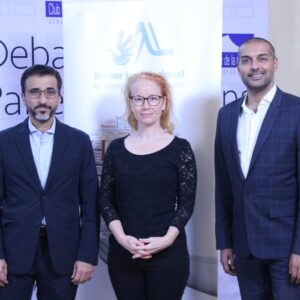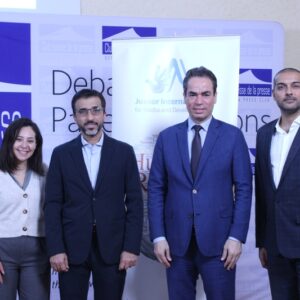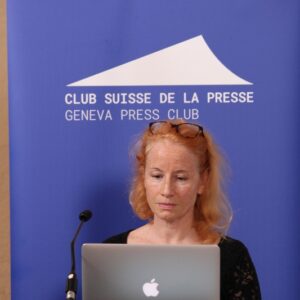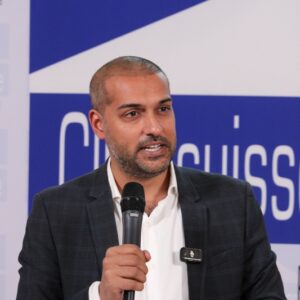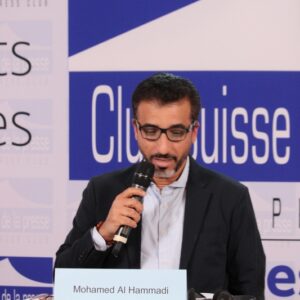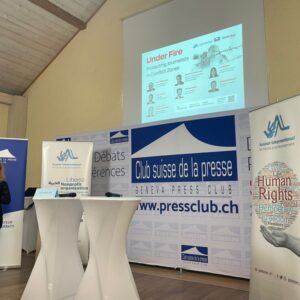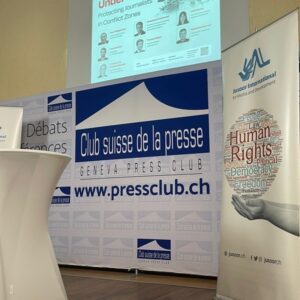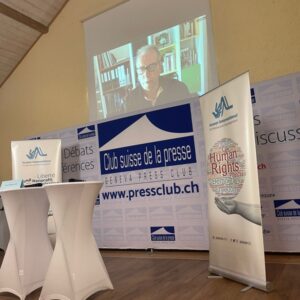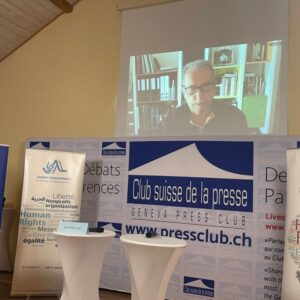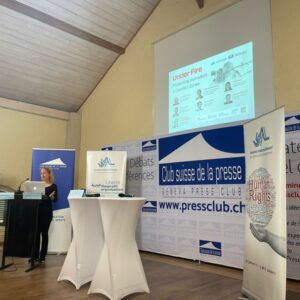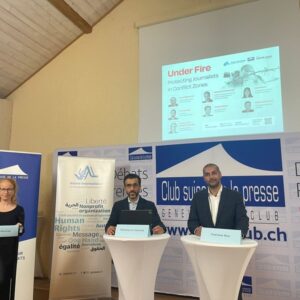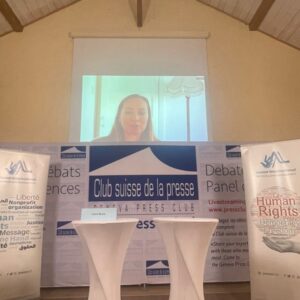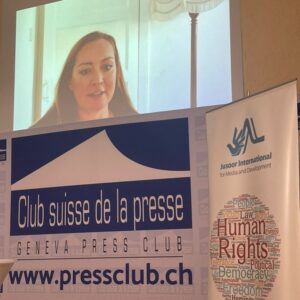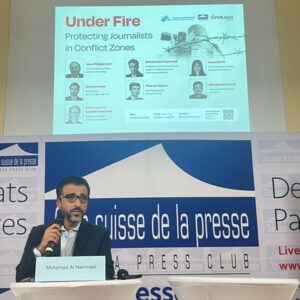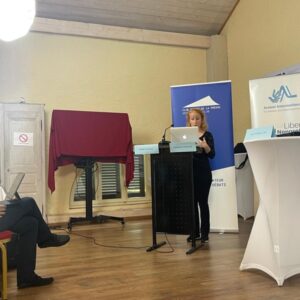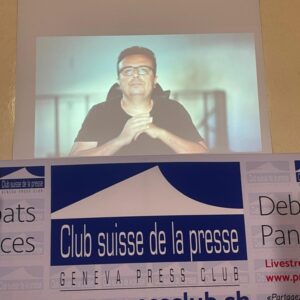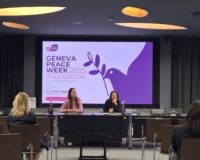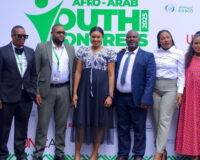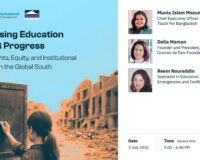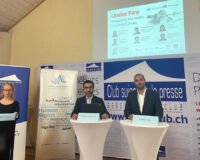
On October 23, 2024, Jusoor International for Media and Development hosted a significant panel discussion, at the Geneva Press Club, titled “Under Fire: Protecting Journalists in Conflict Zones.”
This event united leading experts to address the heightened dangers facing journalists operating in high-conflict regions. The session was moderated by Isabelle Falconnier, Executive Director of the Geneva Press Club, and explored urgent challenges to press freedom worldwide while proposing actionable strategies for protecting journalists in volatile environments.
Introducing Jusoor International for Media and Development
Established in Geneva in 2019, Jusoor International for Media and Development is dedicated to promoting best practices in media and advancing human development globally. With a focus on bridging the gap between global professionals, legal experts, and media practitioners, Jusoor strives to address pressing human rights issues. Our mission centers on amplifying the voices of victims of abuse and acting as an agent for transformative change toward justice and equality. Operating primarily in the MENA region, we work alongside the United Nations and key human rights organizations to drive systemic change. Jusoor’s work is divided into three core programs:
Investigating and Reporting Program – Focused on exposing human rights abuses to influence policy reforms.
Emergency and Response Program – Providing rapid, data-driven humanitarian aid across the MENA region.
Freedom of Expression Program – Advocating for journalist safety, particularly in conflict zones, through global campaigns, training, and resources.
This panel directly reflects the aims of our Freedom of Expression Program, furthering global discourse on press freedom and empowering journalists at the forefront of conflict reporting.
Introducing the Speakers
The panel featured distinguished speakers who brought unique insights to the complex issue of journalist protection:
Mohamed Al Hammadi is a distinguished journalist, writer, and media expert, serving as the founder and President of the Jusoor International Center for Media and Development and editor-in-chief of Jusoorpost. His career spans various leadership roles, including Assistant to the President of the General Union of Arab Journalists and former Chairman of the UAE Journalists Association. He has led major publications such as Al Ittihad and National Geographic Arabia and holds a Master’s in Journalism from the Superior School of Journalism, Communication and International Relations in Paris. Al Hammadi has received several prestigious awards, including the Federal Personality of the Year (2012) and the Distinguished Journalist Award from the Dubai Press Club (2001). With over 4,000 articles and numerous publications, including The Time of the Tribulation and Emirates Democracy, he remains an influential figure in the media world and is active in multiple press associations globally.
Jean-Philippe Jutzi is a veteran journalist and communication advisor with over 25 years in print media, specializing in international and national politics. He has held leadership roles such as Deputy Editor-in-Chief at 24 Heures and various positions at Le Matin and La Liberté in Switzerland, along with serving as President of the Vaud Journalists’ Association and holding prominent roles within the International Francophone Press Union (UPF). His five years in humanitarian aid took him to conflict zones worldwide, including Mozambique, Pakistan, and Haiti, and his crisis communication expertise led him to the Swiss Ministry of Foreign Affairs, where he served as spokesperson for the Swiss Foreign Minister and as a cultural advisor in Swiss embassies in France and China. Alongside his media and diplomatic roles, Jutzi has been involved in cultural communication, non-profit leadership, and humanitarian development. Based in Lausanne, he holds a Political Science degree from the University of Geneva and is fluent in French, English, and German.
Mohamed Sawwaf is an independent Palestinian journalist and filmmaker and the founder of Alef Multimedia in Palestine. He holds a Bachelor’s in Media Studies and has pursued postgraduate studies in Contemporary History. Sawwaf has directed over thirty award-winning documentaries, receiving honors such as the 2024 Royal Television Society Award for Television Journalism in the UK, the Edward R. Murrow Award, the Sanford St. Martin Award, and a Gold Medal at the 2024 New York Film Festival. His films The World at a Crossroads and Eleven Days in May have earned him the Hinzpeter Award and the RAMDAM Festival Award in Belgium, respectively. Having witnessed the latest Israeli war on Gaza, he documented his experiences in film, despite being seriously injured and losing several family members during the bombardment.
Thomas Mason is an experienced security engineer at OccamSec, specializing in network and web application penetration testing. His technical skills extend to IoT security, radio frequency analysis, cryptanalysis, and satellite communications, among other security domains. With a graduate degree in applied mathematics from the Courant Institute at NYU, Thomas has contributed research to fields such as network science, cryptography, and AI. His background in open-source intelligence, journalism, and political science equips him to rigorously analyze the intricate social, institutional, and historical dimensions influencing information security in conflict zones.
Ousman Noor is a human rights barrister from the United Kingdom, holding a law degree from SOAS, University of London, and a Master’s in Social Anthropology from the University of Oxford. Formerly the Government Relations Manager in Geneva for an international campaign against Autonomous Weapons, Ousman now serves as Co-Director of The Civilian Agenda. His work focuses on advocacy and filmmaking to amplify civilian narratives within armed conflicts, highlighting the civilian impact of warfare and advocating for international protections.
Laura Burns is a documentary producer and director with over 15 years of experience in conflict and international crime films, including work for BBC documentaries. She holds a Master’s degree from the Geneva Academy in the International Law of Armed Conflict, with her thesis analyzing ISIS’s use of trials in non-international armed conflicts. Laura’s research spans topics such as non-state armed groups in Ireland, Boko Haram in Nigeria, and ISIS activities in Syria and Iraq. She now works freelance, contributing to a nuanced understanding of complex issues surrounding international conflict.
Introducing the Organizations:
Press Emblem Campaign (PEC)
PEC, established in 2004 in Geneva, is an international, independent NGO with special consultative status at the UN. PEC focuses on strengthening legal protections for journalists globally, particularly in conflict zones. It tracks journalist casualties, provides yearly reports on media safety, and advocates for international agreements, such as the International Convention on the Protection of Journalists. PEC also offers annual awards recognizing efforts to protect journalists.
The Civilian Agenda
The Civilian Agenda is an international non-profit dedicated to protecting civilians caught in conflict zones. Through advocacy, legal action, and support for human rights defenders, The Civilian Agenda works to mitigate harm to civilians, especially in regions affected by armed conflict. It engages in public awareness campaigns and promotes global legal standards aimed at reducing civilian casualties.
Geneva Press Club
The Geneva Press Club is a hub for international media, offering a platform for dialogue between journalists, diplomats, and global organizations. It plays a crucial role in fostering free press and transparency by organizing events that bring together key stakeholders in media, human rights, and public policy. Located in Geneva, the club promotes journalistic excellence and provides professional support to media representatives worldwide.
Speaker Interventions
Mohamed Al Hammadi
Al Hammadi opened the discussion by introducing Jusoor International and highlighting how the event fits within the broader mission of its programs, particularly the Freedom of Expression program. He emphasized the vital role of protecting journalists in conflict zones to maintain a free and fair press globally.
Isabelle Falconnier (Moderator)
As the moderator, Falconnier introduced the speakers and their respective organizations, framing the critical topics to be discussed in the panel, including journalist safety, legal protections, and best practices for reporting in conflict areas.
The Current State of Journalist Safety
Jean-Philippe Jutzi highlighted PEC’s initiatives in tracking journalist casualties, sharing 2023’s devastating statistics and the heightened risks posed by complex modern conflicts. PEC’s advocacy efforts for stronger legal frameworks, such as the International Convention on the Protection of Journalists, are crucial to addressing these issues, especially with escalating violence and repression.
Challenges and Risks for Journalists
Mohamed Sawwaf presented firsthand accounts of reporting under life-threatening conditions, especially in Palestine. He recounted experiences of violence, intimidation, and arrests, and the emotional toll of witnessing war. Sawwaf underscored the resilience required by journalists to bring vital stories to light, often under extreme and dangerous circumstances.
Effective Measures and Best Practices
Thomas Mason elaborated on the critical importance of digital safety in conflict zones, highlighting both established tools and emerging threats. He explained the evolving nature of digital security and shared guidelines for journalists on maintaining data integrity and personal security. Additionally, he touched on strategies like steganography and cryptography, crucial for securely storing and transmitting information.
Ousman Noor expanded on the repression of journalistic freedom in conflict areas, particularly in the Israeli-Palestinian context. He critiqued the limitations placed on journalists by biased narratives, highlighting the necessity of independent media to challenge these restrictions and expose human rights violations. Noor’s message underscored the moral imperative for journalists to report accurately, even amid extreme threats.
Laura Burns reflected on her experiences from Northern Ireland, reinforcing the need for persistent journalism to bring accountability to those responsible for conflict-related crimes. She called for a diverse media environment where truth prevails over controlled narratives.
Case Studies and Real-Life Experiences
Mohamed Al Hammadi shared case studies from the MENA region, demonstrating effective strategies to support and protect journalists in conflict zones. Al Hammadi emphasized international partnerships as essential for developing robust support networks, allowing journalists to safely navigate the challenges of their work.
Some questions and answers from persons attending the panel discussion:
During the Q&A, Egyptian writer Ahmad Al Moslimani asked about the responsibility of global media to publish truthful coverage of conflict zones. He pointed out the disparity between the volume of information generated by journalists on the ground and its limited representation in Western media. Mohamed Al Hammadi responded, emphasizing the need for media institutions to honor the sacrifices of journalists and ensure that crucial information reaches the public.
An online participant raised a question for Thomas Mason on protecting sensitive information held by journalists in conflict zones. Mason detailed advanced cryptographic techniques like steganography, which allows journalists to conceal data within benign files, helping them evade detection.
Conclusion
The “Under Fire: Protecting Journalists in Conflict Zones” panel highlighted the urgent need for international solidarity, legal reform, and technological advancement in safeguarding journalists worldwide. Mohamed Al Hammadi called for leveraging AI to enhance the protection of journalists in emergency hotspots, noting its potential in monitoring, analyzing, and mitigating risks where truth is under threat.
This event served as a catalyst for action, reinforcing the importance of press freedom and global responsibility in supporting those on the frontlines of conflict. Jusoor International is committed to advancing this conversation through continued advocacy and partnerships, inviting stakeholders, media professionals, and followers to stay engaged.
In alignment with this commitment, Jusoor will soon release a full recording of the panel discussion to foster further dialogue and enable broader access to the insights shared by our esteemed panelists. We encourage our followers to join this ongoing conversation and participate actively in our future initiatives.
In partnership with:




